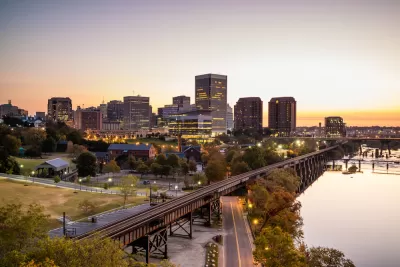Switching from property tax to a land value tax could rein in sprawl, boost urban density, and lower the cost of housing.

Connor Scribner argues that a land value tax could slow sprawl and help reduce the number of miles driven by Americans, who drive more miles per capita than any other nation. Even with a shift to electric vehicles, Scribner writes, sprawl has other negative environmental impacts. "In fact, while a switch to electric vehicles may decrease carbon emissions, it would likely increase the emissions of non-exhaust pollution. In order to accomodate long-distance trips, EVs need large batteries that make them heavier than gas-powered vehicles, meaning wear on and the subsequent pollution from tires and brakes is made worse."
Sprawl also destroys natural habitats, disrupts animal migration, and reduces biodiversity. Paved surfaces intervene with natural drainage processes and radiate heat, while stormwater channeled into natural bodies of water carries toxic pollutants and runoff.
According to Scribner, part of the reason sprawl takes hold is the cost of construction in the denser urban core. In Richmond, property taxes on buildings sometimes discourage property owners from developing a lot. By taxing even undeveloped land, the city could remove this incentive to let land sit unimproved. A 2015 research study found that "a land value tax would help to decrease the price of housing and increase urban density."
Scribner argues that a land value tax would benefit all Richmond residents rather than keep benefits with landowners and encourage more development on underused lots.
FULL STORY: Richmond’s urban sprawl threatens the environment. Taxing land may rein it in

Maui's Vacation Rental Debate Turns Ugly
Verbal attacks, misinformation campaigns and fistfights plague a high-stakes debate to convert thousands of vacation rentals into long-term housing.

Planetizen Federal Action Tracker
A weekly monitor of how Trump’s orders and actions are impacting planners and planning in America.

In Urban Planning, AI Prompting Could be the New Design Thinking
Creativity has long been key to great urban design. What if we see AI as our new creative partner?

King County Supportive Housing Program Offers Hope for Unhoused Residents
The county is taking a ‘Housing First’ approach that prioritizes getting people into housing, then offering wraparound supportive services.

Researchers Use AI to Get Clearer Picture of US Housing
Analysts are using artificial intelligence to supercharge their research by allowing them to comb through data faster. Though these AI tools can be error prone, they save time and housing researchers are optimistic about the future.

Making Shared Micromobility More Inclusive
Cities and shared mobility system operators can do more to include people with disabilities in planning and operations, per a new report.
Urban Design for Planners 1: Software Tools
This six-course series explores essential urban design concepts using open source software and equips planners with the tools they need to participate fully in the urban design process.
Planning for Universal Design
Learn the tools for implementing Universal Design in planning regulations.
planning NEXT
Appalachian Highlands Housing Partners
Mpact (founded as Rail~Volution)
City of Camden Redevelopment Agency
City of Astoria
City of Portland
City of Laramie





























